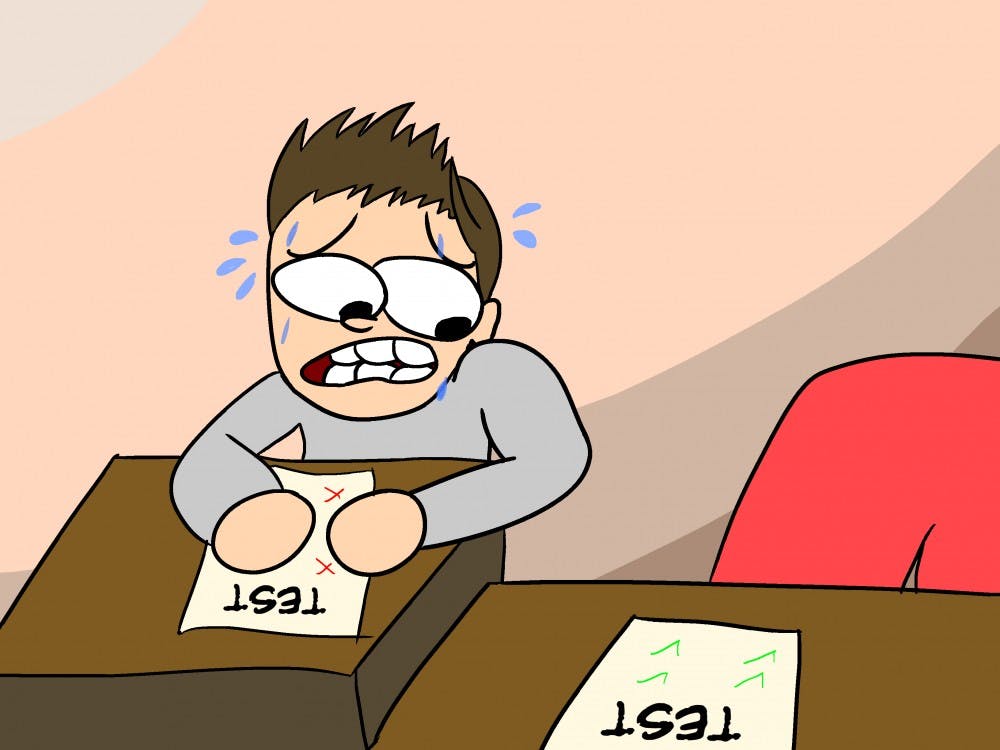With finals week coming up, many students are probably under a lot of pressure, and have maybe even considered cheating on an exam. Michael Baer, an assistant professor at the ASU W.P. Carey School of Business said the reasons students cheat are not that different from those of employees under pressure to meet quotas.
Baer is studying cheating within organizations and why employees cheat. He said in addition to feeling pressure to succeed in school from parents, students place a lot of pressure on themselves.
“If you take the time to study ahead of time then you're not up against the clock when it comes down to it,” Baer said. “If you wait until the last minute and you have to achieve this difficult goal, and there's that pressure, you've now eliminated the liable ethical option which is studying.”
Baer said that because they procrastinate, many students put themselves in a position where they either have to accept a bad grade or cheat.
“I’ve done a lot of work looking at performance goals and how goals can have unintended side effects,” David Welsh, an assistant professor at the W.P. Carey School of Business, said. “Some of my recent work looks at how you could use a goal to motivate performance without at the same time motivating unethical behavior.”
Welsh said scholars advocate for placing goals and setting the bar high to improve employees' performance. He said goals can be sales goals for employees, or a high GPA or scholarship for students.
“These goals can encourage them to work harder, but sometimes it could encourage them to do whatever it takes, and that’s when it becomes a problem,” Welsh said.
Organizations like Wells Fargo made international headlines when it was discovered that employees were engaging in unethical behavior to meet their employers' goals. Wells Fargo employees resorted to opening fake accounts dating back to 2009. In another case, diesel-powered Volkswagen cars being sold in the U.S. were equipped with devices to cheat emissions tests.
Baer said that these organizations placed unrealistic goals on their employees, which led to these scandals.
He said students can relieve pressure, similar to that placed on the employees of these companies, by being prepared. This would prevent them from engaging in academic dishonesty. Students who are caught cheating on an exam or plagiarizing can face severe consequences.
Joseph Van Orden, assistant dean of academic affairs at the W.P. Carey School of Business, said that each school within ASU handles cheating differently depending on the severity of the offense.
A student at the Walter Cronkite School of Journalism and Mass Communication would be kicked out after the first offense of plagiarism and a mark of academic dishonesty would be placed on their transcript. Other schools may choose to issue a warning after the first offense.
“We catch more (students cheating) in some of our lower level classes, but that’s just because we have software to do it,” Van Orden said. “Plagiarism is usually caught in upper level classes. We have software that can tell if someone is not doing their own work.”
Van Orden said it’s hard to know at what level students cheat more because not all classes use the same methods to monitor for cheating. He also said that there is a learning curve expected from undergraduate students. However, graduate students are held to a higher standard and would be removed from the university after their first offense.
Van Orden is working with a committee to establish a universal guideline for dealing with academic dishonesty.
Baer said that in addition to being reprimanded, students who choose to engage in academic dishonesty are cheating themselves and don't learn the skills they need.
"If you're to committed to that goal and that becomes more important than adhering to ethical standards, that becomes a problem," Baer said.
Reach the reporter at jicazare@asu.edu or follow @sonic_429 on Twitter.
Like State Press on Facebook and follow @statepress on Twitter.




